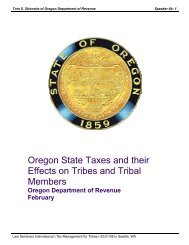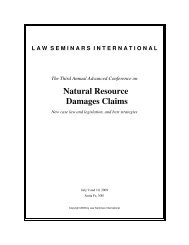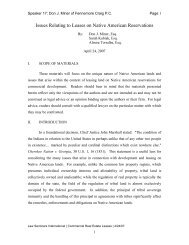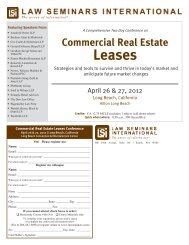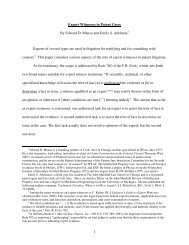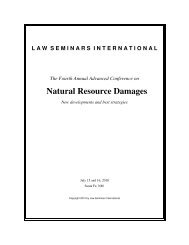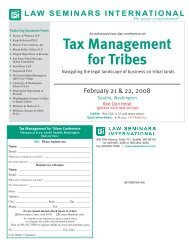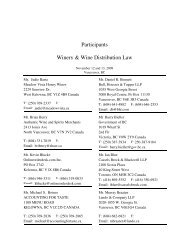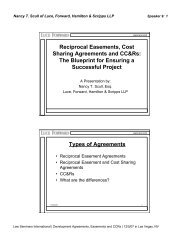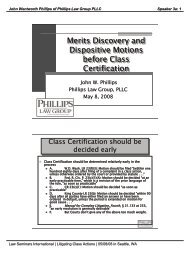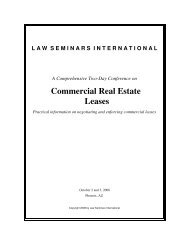LSI 2010 Real Estate Joint Ventures conference materials.pdf
LSI 2010 Real Estate Joint Ventures conference materials.pdf
LSI 2010 Real Estate Joint Ventures conference materials.pdf
Create successful ePaper yourself
Turn your PDF publications into a flip-book with our unique Google optimized e-Paper software.
Brian Todd of Davis Wright Tremaine LLP<br />
Andrew H. Zuccotti of K&L Gates LLP<br />
was less than what Insight would otherwise receive, then the LLC was to allocate other<br />
income, such as capital gain, to make up the difference. The term “ordinary income” was<br />
not defined. Insight argued that the term “ordinary income” excluded capital gain and<br />
moved for summary judgment. The LLC argued that the plan meaning of “ordinary<br />
income” is income taxed at ordinary income tax rates and that the term includes,<br />
therefore, short term capital gain. The court held that the term “ordinary income”<br />
unambiguously excluded short-term capital gain.<br />
Speaker 11: 8<br />
Speaker 12: 8<br />
2004WL.<br />
2. Interactive Corp v. Vivendi Universal, S.A. (Del. Ch. 2004)<br />
In this case, an LLLP was formed and its agreement provided for a profits<br />
allocation waterfall in which preferred units received a priority profits allocation in a<br />
specified annual percentage (the “Preferred Return”) and after such allocation residual<br />
profits were allocated based on percentage interests. Tax distributions were to be made<br />
annually in an amount “[e]qual to the product of (a) the amount of taxable income<br />
allocated to such partner for such taxable year pursuant to Section 7.02 [the entire<br />
waterfall] and (b) the highest aggregate marginal statutory federal, state, local and foreign<br />
income tax rate . . ..” Thus, the LLLP Agreement in effect made the preferred return an<br />
after-tax amount. Vivendi contended that the LLLP was not required to make tax<br />
distributions to the preferred interest holder, the tax distribution having already been<br />
satisfied by the distribution of the Preferred Return. In addition, Vivendi argued the<br />
doctrines of waiver, estoppel, unclean hands, mutual mistake and unilateral mistake, all<br />
of which it claimed supported reformation of the contract. The count rejected each of<br />
these arguments and followed the “plain meaning” of the agreement.<br />
III.<br />
Examples.<br />
A. “Liquidation-By-Capital-Accounts” Allocation Provisions.<br />
8.4 Capital Accounts.<br />
8.4.1 Maintenance. A capital account (“Capital<br />
Account”) shall be determined and maintained for each Member in<br />
accordance with the principles of Regulation Section 1.704-1(b) at all<br />
times throughout the full term of the Company. In the event of a<br />
permitted sale or assignment of all or any part of an Interest, the Capital<br />
Account of the transferor shall become the Capital Account of the<br />
transferee to the extent it relates to the transferred Interest.<br />
8.4.2 Capital Account Adjustments, in General. The<br />
book value of all Company properties shall, upon Board Approval, be<br />
adjusted to equal their respective gross fair market values (as reasonably<br />
determined by the Board) as of the following times: (a) in connection with<br />
the acquisition of an Interest in the Company by a new or existing<br />
Member for more than a de minimis Capital Contribution; (b) in<br />
connection with the liquidation of the Company as defined in Regulation<br />
DWT 12372832v1 0053770-000001<br />
Law Seminars International | <strong>Real</strong> <strong>Estate</strong> <strong>Joint</strong> <strong>Ventures</strong> and Funds | 02/08/10 in Seattle, WA




